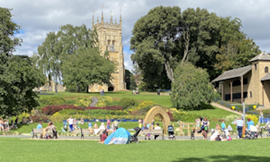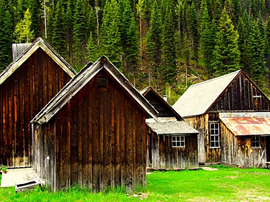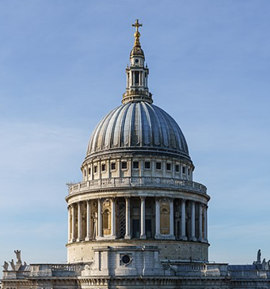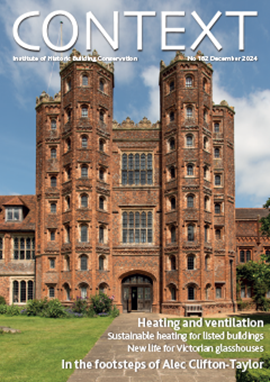CPP APPG holds first public inquiry
Contents |
[edit] Introduction
The All-Party Parliamentary Group (APPG) on Conservation, Places and People (CPP APPG) has announced its first inquiry, 21st century places – values & benefits. The inquiry is serving as a wide-ranging call for evidence from all stakeholders.
Layla Moran MP, Chair of the APPG, said: ‘I’m looking forward to making a start with this inquiry. Like many MPs, I’m aware of just how valuable heritage can be in helping to regenerate our towns and high streets.’
[edit] Promoting regeneration
In the inquiry, the CPP APPG states:
Historic buildings and neighbourhoods can be key elements in the regeneration of cities, towns and rural areas across the UK. Many of the high streets and town centres, which are in the greatest need of revival due to their location in economically depressed parts of the UK, also possess the richest legacies of historic buildings. Their rural and natural settings are no less important aspects of their survival as valued places with viable, low-carbon economies.
Restoring and finding new uses for these treasured local landmarks can help to preserve local distinctiveness and sense of place, the value of which has been heightened for many people during their experience of lockdown.
Selective redevelopment, which capitalises on historic assets, has often proved to be more commercially and socially successful than large-scale comprehensive redevelopment.
Finding fresh uses for old buildings can help to modernise and adapt our historic neighbourhoods for the needs of the 21st century and the new living, working and recreational patterns, which have emerged in the wake of COVID-19 pandemic. However, projects to regenerate historic buildings and areas are often difficult to get off the ground due to financial obstacles, like the unequal tax treatment between refurbishment and new construction projects.
The inquiry will conduct an initial call for written evidence to explore these issues.
[edit] Terms of reference
The Committee invites written submissions on:
- What evidence exists of the economic, social and environmental benefits from the conservation, care and regeneration of historic buildings and areas, across the UK.
- How can the conservation and regeneration of historic areas contribute to the wider agendas of governments across the UK to equity and ‘levelling up’, along with their focus on high streets revival?
- Is there a case for further increasing the level of investment in the heritage and infrastructure of places outside London and the south east of England to assist the ‘levelling up’ of lagging regional economies?
- How can regeneration of the historic environment contribute to - and interact with - efforts to revive local economies in the wake of the COVID-19 pandemic and subsequent recession?
- What evidence exists that historic buildings provide flexible, low rental space for start-up businesses, social enterprises and community facilities, thereby helping to stimulate local economies, particularly in more peripheral neighbourhoods?
- How has heritage regeneration helped to boost the image and social cohesion of the areas they are located in, attracting investment and providing a catalyst for reversing economic decline?
- How can the care, repair and regeneration of the historic environment help to meet the UK’s commitment to sustainable development, including cutting emissions to net zero by avoiding the use and waste of scarce resources associated with demolition and redevelopment?
- How can conservation-led regeneration of the historic environment help to promote sustainable patterns of development, striking the right balance between economic growth and social equity, while also curbing wasteful emissions?
- What are the implications of the government’s reforms to the English planning system, proposed in the planning white paper, for the conservation and regeneration of historic areas?
- What have been the impacts of cuts in local government to the capacity of planning departments to facilitate the conservation and regeneration of sensitive historic areas?
- How can post pandemic efforts to boost skills training support efforts to revive neglected crafts key to historic building conservation?
- How can the conservation and restoration of historic parks and other important green spaces contribute to efforts to encourage exercise and thereby promote health and well-being?
The call for evidence closes on 29 January 2021. Submissions should be in digital format and uploaded HERE (NB: up to 25 Mb)
For submission queries, contact [email protected]
This article originally appeared on the IHBC NewsBlog under the headline, 'Reminder: New APPG Parliamentary Inquiry into "21st Century Places: Values and benefits" call for evidence closes 29 January'. It was written by Joanna Theobald and published on 5 Jan 2021.
--Institute of Historic Building Conservation
[edit] Related articles on Designing Buildings
- All party parliamentary group APPG.
- Conservation.
- High street.
- High street (planning and policy).
- IHBC articles on Designing Buildings Wiki.
- New UK Conservation, People and Places APPG launches.
- Regeneration.
[edit] External resources
- Conservation, Places & People APPG, INQUIRY 21st century places: values and benefits.
IHBC NewsBlog
SAVE celebrates 50 years of campaigning 1975-2025
SAVE Britain’s Heritage has announced events across the country to celebrate bringing new life to remarkable buildings.
IHBC Annual School 2025 - Shrewsbury 12-14 June
Themed Heritage in Context – Value: Plan: Change, join in-person or online.
200th Anniversary Celebration of the Modern Railway Planned
The Stockton & Darlington Railway opened on September 27, 1825.
Competence Framework Launched for Sustainability in the Built Environment
The Construction Industry Council (CIC) and the Edge have jointly published the framework.
Historic England Launches Wellbeing Strategy for Heritage
Whether through visiting, volunteering, learning or creative practice, engaging with heritage can strengthen confidence, resilience, hope and social connections.
National Trust for Canada’s Review of 2024
Great Saves & Worst Losses Highlighted
IHBC's SelfStarter Website Undergoes Refresh
New updates and resources for emerging conservation professionals.
‘Behind the Scenes’ podcast on St. Pauls Cathedral Published
Experience the inside track on one of the world’s best known places of worship and visitor attractions.
National Audit Office (NAO) says Government building maintenance backlog is at least £49 billion
The public spending watchdog will need to consider the best way to manage its assets to bring property condition to a satisfactory level.
IHBC Publishes C182 focused on Heating and Ventilation
The latest issue of Context explores sustainable heating for listed buildings and more.

















